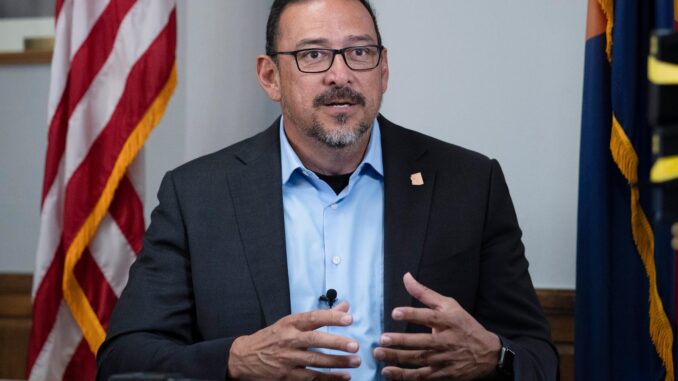
PHOENIX — The number of voters in the battleground state of Arizona classified as having full access to the ballot without confirmation they are citizens has more than doubled to 218,000, Secretary of State Adrian Fontes said.
That number represents 5.3% of all registered voters. While the error won’t change who is eligible to vote for president or Congress, that amount of voters could sway tight local and state races, and hotly contested ballot measures on abortion and immigration.
Arizona is unique in that it requires residents to prove citizenship to vote a full ballot — a requirement dating back to 2004. If they don’t do that but attest under penalty of perjury to being citizens, they can vote in federal races only.
Fontes announced Monday that the number of misclassified voters jumped from about 98,000 last month to around 218,000.
It’s unclear how officials missed the additional bloc of voters after saying two weeks ago that an error between the state’s voter registration database and the Motor Vehicle Division, or MVD, had been fixed.
Aaron Thacker, a spokesperson for Fontes’ office Tuesday that the fix that MVD put in place didn’t solve the problem.
The Arizona Department of Transportation, which oversees the MVD, said in an email that it created a coding update in its system but didn’t specify when it was implemented.
Around Arizona, a relatively small number of votes could tip the scales in competitive races for the Legislature, where Republicans hold a slim majority in both chambers. This year, voters also will decide on the constitutional right to abortion and a measure to criminalize people from entering the state illegally from Mexico.
The Arizona Supreme Court ruled last month that the original batch of voters can cast a full ballot in this year’s election because they registered long ago and attested under the penalty of perjury that they are citizens. The justices said the voters were not at fault for the error and shouldn’t be disenfranchised so close to the Nov. 5 general election.
Fontes said that ruling should also apply to the new batch of voters, who are nearly evenly split among Democrats, Republicans and voters who aren’t registered with either of those parties.


Be the first to comment